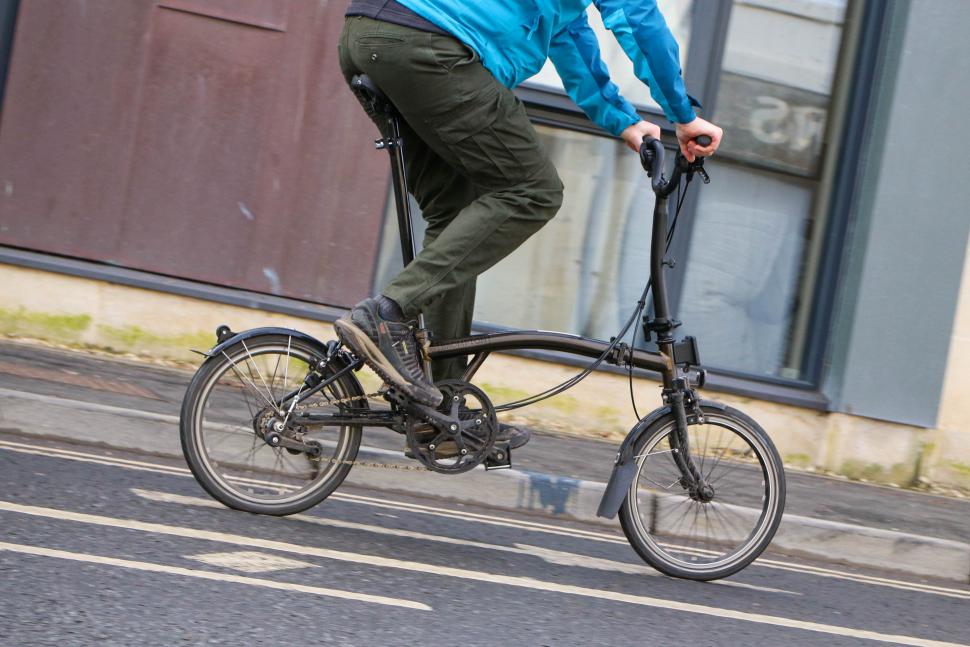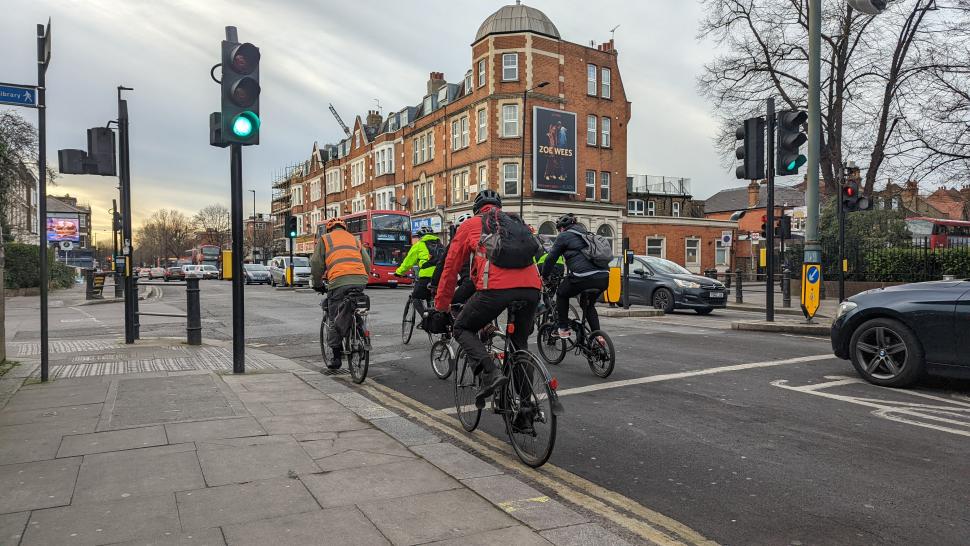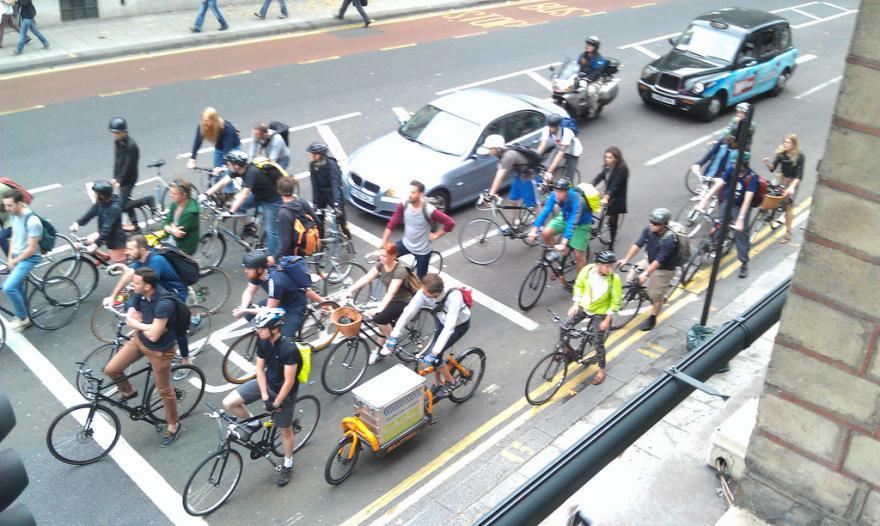- News
- Reviews
- Bikes
- Accessories
- Accessories - misc
- Computer mounts
- Bags
- Bar ends
- Bike bags & cases
- Bottle cages
- Bottles
- Cameras
- Car racks
- Child seats
- Computers
- Glasses
- GPS units
- Helmets
- Lights - front
- Lights - rear
- Lights - sets
- Locks
- Mirrors
- Mudguards
- Racks
- Pumps & CO2 inflators
- Puncture kits
- Reflectives
- Smart watches
- Stands and racks
- Trailers
- Clothing
- Components
- Bar tape & grips
- Bottom brackets
- Brake & gear cables
- Brake & STI levers
- Brake pads & spares
- Brakes
- Cassettes & freewheels
- Chains
- Chainsets & chainrings
- Derailleurs - front
- Derailleurs - rear
- Forks
- Gear levers & shifters
- Groupsets
- Handlebars & extensions
- Headsets
- Hubs
- Inner tubes
- Pedals
- Quick releases & skewers
- Saddles
- Seatposts
- Stems
- Wheels
- Tyres
- Health, fitness and nutrition
- Tools and workshop
- Miscellaneous
- Buyers Guides
- Features
- Forum
- Recommends
- Podcast
news
Chris Froome divides opinion with topic even MORE controversial than disc brakes — shows off his new "trendsetter" Crocs; Reaction to bike shops urging MPs for changes to Cycle to Work scheme + more on the live blog
SUMMARY
 Chris Froome Crocs (Israel - Premier Tech/Instagram)
Chris Froome Crocs (Israel - Premier Tech/Instagram)26 January 2024, 08:58
Chris Froome divides opinion with topic even MORE controversial than disc brakes — shows off his new "trendsetter" Crocs
And we thought disc vs rim brakes was a big debate... whether Crocs are fashionable and whether they're suitable footwear for grown adults might just be even bigger...
Grand Tour winner ☑️
Olympic medalist ☑️
Fashion trendsetter ❔❕If you see the 2024 peloton wearing @Crocs in the coming months, we’ll know @chrisfroome started the craze 😉#YallaIPT pic.twitter.com/TfHwUyo4FG
— Israel – Premier Tech (@IsraelPremTech) January 25, 2024
Exhibit A:
As a person living with someone who got a pair for Christmas too I'm going to have to watch what I say here. The durable quirky-looking footwear has exploded in recent years, Crocs growing to a multi-billion dollar company and their squidgy shoes being seen on the feet of celebrities around the world. And I've got to admit, even as a sceptic, they do feel good...
Time for some more Croc praise (plus Luke asking the important questions)...
Although Mr Froome might be a tad disappointed to hear he's been stripped of that fourth yellow jersey due to an anti-fashion violation.
Rapha, Palace and EF Education-EasyPost also might have something to say about the "trendsetter" tag. You might remember that trio collaborating during the 2022 Tour de France, producing an eye-catching switch-out kit for the race (and a range of products including EF-branded Crocs)...
And a trip down memory lane and into the comments section on our story on that tells you all you need to know about the divided public opinion on Crocs (don't tell Joey Barton, GB News and Laurence Fox, we really don't have the energy for Crocs to become a new culture-warring frontier or anything more than a bit of light-hearted Friday live blog fun)...
Exhibit C:
"Crocs on an adult are just code for 'Yes, I have given up; thank you for asking!'"
"£35 for a pair of flipflops? I'll just stick to my local flipflop dealer that sells a few pairs at £5 each."
"The only people who don't like Crocs are people who've not worn Crocs (that's a science fact)."
"No, I won't be wearing the Crocs, as I am an adult."
"I actually want a pair of the Crocs. Shoot me now."
The marmite of footwear. You can leave your disc rotor ranting in 2023, Chris...
26 January 2024, 17:36
Halfords' cycling revenue falls owing to "significantly worse than anticipated" bike market, as it continues shift towards motoring services
26 January 2024, 15:09
Could cake be the answer to combating close passes?
Too good not to share - a friends cake transportation! Hope she got them there OK!!
Cake - preventing close passes everywhere! pic.twitter.com/I3yOt7ozen— CyclingInASkirt (@CyclingInASkirt) January 26, 2024
Red (presta) valvet cake? Vittoria sponge? In fairness, probably just a coffee cake if made by a cyclist...
EDIT: Strong additional suggestions from the road.cc office... marzipannier... a panniertone...
You can't say we don't bring you top-class content here on the live blog...
26 January 2024, 14:56
"Volunteer" cyclists to be invited for trial allowing bikes on Manchester trams, as councillors express "serious concerns" about safety
26 January 2024, 14:45
The great Croc debate of January 2024
Froome's shout-out to the marmite of footwear has certainly got you lot talking.
The case for the defence...
Creakingcrank: "I once did a 150-mile cycling holiday with two kids and trailer full of camping gear using Crocs as my only footwear. And I'm not ashamed of it."
mctrials23: "Crocs are bloody amazing and the only people who don't think so are those that have never worn them."
stonojnr: "Exactly that, when you want an easy slip on shoe to wear whilst prepping your bike or kit pre or post ride, so you arent slipping over or tripping over yourself wearing cycling cleats, they're perfect."
As the owner of a 10+ year-old pair of battered, discouloured Adidas sliders for exactly that purpose, I certainly relate. Maybe if they were Crocs the sole wouldn't be threatening to rip off any day now...
Matthew Acton-Varian: "Cycling + crocs = nope."
brooksby: "Existence + crocs = nope."
Maybe you just need to give them a go?
26 January 2024, 13:25
Brompton "futureproofs business" by joining new e-commerce site
Brompton is the latest cycling brand to join e-commerce platform BigCommerce, Bike Biz reports. BigCommerce already counts Yeti Cycles and Mango Bikes among the list of brands who sell using its services, and announced that Brompton would be joining after years of struggle with its previous e-commerce platform.
Brompton expects to increase direct-to-consumer sales as a result, something the folding bike brand expects will become 50 per cent of its business in the coming years.
"The bike purchase is very omnichannel. We've recently launched a 28-day satisfaction guarantee in the UK and offer a bike hire programme where people can rent a bike and try it out for a while before deciding to buy one," Brompton's IT and digital director Oliver Boardman commented.
"With our new composable site, we know we'll be able to add that to our current website and provide a seamless experience for our customers in the future. Our old system arguably could have been called composable, but it wasn't purpose-built that way.
"The components didn't work together well, and we didn't have nearly as much flexibility as we needed. BigCommerce showed us that they could provide a true composable platform capable of scaling with us and our customers."
26 January 2024, 11:32
No wonder he's exhausted...
Jurgen Klopp is leaving Liverpool because he is "running out of energy". Not surprised - he's never off that Peloton bike, course he's knackered pic.twitter.com/IboupC2vpv
— Pip (@pipmadeley) January 26, 2024
26 January 2024, 11:31
Orange Bikes put up for sale and deemed "unable to continue trading" by administrators
26 January 2024, 10:29
The BEST cycling products and bikes that we tested in 2023!
26 January 2024, 10:02
Reaction to bike shops urging MPs for changes to Cycle to Work scheme
Plenty of reaction to the Association of Cycle Traders, on behalf of more than 500 bike shops, and senior representatives from Balfe's Bikes and JE James, meeting with MPs to urge changes to the Cycle to Work scheme. With comments about it being too complicated, excluding many people (some of whom would benefit most from such a scheme), that manufacturers should contribute to fees, unequal distribution of costs and fees, plus many more concerns...
But what do you think? Have you bought a bike through the scheme? Any problems? Do you work in a bike shop? Is it, as Mark James of JE James suggested, "sucking the lifeblood out of cycle shops"?
boxrick: "The big issue with Cyclescheme [a provider of the Cycle to Work scheme] is that it is confusing and benefits highest earners. Whilst it is great if you are in the position to benefit from it and can navigate the pains. It doesn't make much sense from a fairness point of view."
zweiblumen: "The Cycle to Work scheme is not now and never has been fit for purpose. I've bought probably half a dozen bikes while working for employers that operate the scheme and never once considered using it. So I pay for a bike out of my pre-tax salary and at the end of the contract I don't own the bike, and if I want to keep it I must pay the 'market rate' for the used bike that I've ridden from new? Erm, no thanks! The fact that the retailers are also suffering under the schemes is no surprise at all."
super_davo: "I've used the scheme loads of times and helped lots of others use the scheme and you're painting a horror story that doesn't exist in practice. You apply for a voucher and you get deductions from your gross salary over a year to pay for that voucher. This can be a very useful way to lower your salary if you're in one of the very high marginal rates (e.g I've used it to dip under high income child benefit charge).
"At the end of the period you either have to pay "a fair market value" charge to your employer which is c25 per cent of the price (i.e. less than the tax+NI in the first place) or you tick a box 'to extend hire' for 4 years and pay nothing. Whilst technically you do not own the bike either during the initial hire or extended period, I have never heard of any company ever asking for the bike back. If you don't trust your employer and think they might you probably should be looking for an new one.
"If you leave during the initial hire period then you have to pay the amount net out of your severance. If you leave during the extended period you don't pay anything. The scheme is far from perfect though. It clearly royally screws the retailers. It benefits high earners the most, whilst locking out the poorest that could benefit from it the most due to minimum wage boundaries. It hasn't been updated in 15+ years so it's now a mess of fudge over fudge like 'extended hire periods' and use of consumer credit licences to keep pace with the price of bikes.
"The very fact that so many companies have sprung up to run the admin is proof in itself of that."
Or those on low income. The ctws only benefits the more wealthy who can often afford the bikes anyway. Who uses a £10k to commute?
— Darren (@darrenvs650) January 26, 2024
Get rid of cycle to work & remove VAT on bikes etc. Not every employer offers such a scheme & there are those who are retired, unemployed or on benefits who may want to cycle. The health benefits of cycling should be seen as zero rated under health care.
— Nicola James🚜 (@nljames62) January 25, 2024
26 January 2024, 09:35
A history of Crocs in cycling: April Fool's, DIY, WorldTour merchandise
No, I didn't expect to be writing this today either...
Remember April 2020? Yeah, maybe you've scrubbed that from your brain too. Well, April 1 was met with the usual cycling-related April Fool's gags from bored bike brands, including Velo Kicks' quite funny BOA-dialled version of the footwear everyone loves to hate...
Quite an amusing joke, by April 1st standards, but the premise behind it — Crocs with cycling functionality — are actually a thing. Introducing... SPD Crocs...
Paris-based Valcko Studios announced an SPD version too...
Oh, and then Rapha, Palace and EF Education-EasyPost got involved with the pink colour schemes and sent the cycling world into meltdown during the 2022 Tour de France (no out-the-box cleat compatibility however, although I'm sure Karlonsea could do something about that)...
Maybe a bit of a stretch to call Froomey a trendsetter...
Dan is the road.cc news editor and joined in 2020 having previously written about nearly every other sport under the sun for the Express, and the weird and wonderful world of non-league football for The Non-League Paper. Dan has been at road.cc for four years and mainly writes news and tech articles as well as the occasional feature. He has hopefully kept you entertained on the live blog too.
Never fast enough to take things on the bike too seriously, when he's not working you'll find him exploring the south of England by two wheels at a leisurely weekend pace, or enjoying his favourite Scottish roads when visiting family. Sometimes he'll even load up the bags and ride up the whole way, he's a bit strange like that.
Latest Comments
- Uaf 16 min 39 sec ago
This map link seems close to the described crash location. A couple of cushions hiding in the dappled shadows....
- check12 4 hours 19 min ago
Surely please get down on your knees, rappers rap about gats not cats and foil isn't made from oil and can hold your all told
- David9694 5 hours 41 min ago
The news from Exeter traders is to good today: Justine must furious with all the drivers not carrying anything causing all this traffic:...
- David9694 5 hours 53 min ago
Elderly man sentenced following serious crash in Ringwood...
- Slartibartfast 7 hours 49 min ago
What I find most amazing is that they didn't use this an opportunity to encourage drivers to check their vision and get an eye test. I was waiting...
- kingleo 9 hours 29 min ago
Cyclists have been riding in Bister for about 150 years, and now all of a sudden they are a great danger to pedestrians.
- the little onion 9 hours 56 min ago
I didn't remove the sound because I didn't think that it mattered - quite clearly the swearing was in reaction to an act of frankly horrid...
- Nigel_2003 10 hours 43 min ago
Know how the limiter screws on your derailleur work and use the right ones to keep chain on a manageable cog at the back and/or chainring at the...
- Freddy56 11 hours 6 min ago
Story one: "Here is all the deals at 50% off."...














Add new comment
19 comments
"What about you admitting that you ride one handed should the police make you take a cycle awareness course????"
LED indicating helmets required!
What happened to Adidas Adilettes or whatever they were called?
Froome's taste in clothing = Frome's taste in music
the thing with C2W for all the moans & criticism it gets, no-one has ever come up with a better workable solution. Every alternative that someone suggests usually has at least one if not more drawbacks that impacts someones ability to buy a bike through it. There is no perfect scheme, so accept C2W will always have its limitations.
Because really getting people out on bikes isnt about C2W, you can buy a bike quite cheaply, and with better discounts than C2W gives you, if you really have the mindset to want to ride a bike.
Its more about as an employer providing facilities to safely & securely store bikes & kit, many even in London still dont do that, and wont even let people leave stuff in lockers overnight. And its about providing safer cycling routes for people to use.
Survey after survey, there was that one just last week, repeatedly list the main barriers to people cycling come down to safety first and foremost, then security & facilities in the workplace.
Affordability of a bike never comes up as a barrier, let alone people complaining about if only their employer had C2W theyd be totally cycling for sure.
It's not a dichotomy - there is also the third option of scrapping the scheme altogether and not replacing it.
In many ways I think nothing would be better than the current system. If it's not actually achieving anything useful, then it's just harmful. The primary beneficiaries would appear to be high-income employees and bankers (IIRC CycleScheme is ultimately owned by an American private equity firm) whilst the general public and the bike industry lose out.
In terms of options to replace the scheme, I still think something like scrapping VAT on the first £500 of a bike purchase would be preferable. It would knock 20% off the price of basic but perfectly good bikes, which is more-or-less on par with the C2W scheme savings for basic rate taxpayers. In order to avoid burdensome further admin it would apply to all bikes - so yes this would benefit people buying expensive bikes purely for recreation, but the benefit would be capped at £100 which is arguably far fairer than the current system (someone on a £110k salary who buys a £10k superbike on C2W would effectively only spend £4k, i.e. subsidised £6k from the taxpayer).
Such an approach would have limitations. For example a good quality electric cargobike, which is probably one of the best options for reducing car dependency, is pretty expensive, and so a £100 saving is hardly going to make a difference. So I would like to see more support for people wanting to make that kind of purchase. But having limitations is not the same as being unworkable or harmful. I would also note that, as mentioned in my other post, if you're using the bike primarily for general errands (shopping, school run etc.) that is technically contrary to the C2W scheme rules.
There are more flaws with this.
Firstly, when VAT is 20%, removing it does not reduce the price by 20%, it reduces it by 16.7%. You can bet shortly after this, RRP on bikes will mysteriously increase to where it was before.
Secondly, I'm sure retail businesses such as small LBS already find VAT returns onerous. Having to cope with split rate sales (and would this apply to purchases too?) would turn a chore into a much, much bigger one. I've experienced this with books (exempt) that have an enclosed DVD (standard rate) in an e-commerce platform, it was painful.
Finally, the example of the £110k salary and £10k bike, the subsidy is less than £6k, it's more like £4k. Assuming that individual is paid via a normal payroll and has a standard tax code, their total PAYE/NIC annually to the exchequer is over £36k. I don't have a problem with that individual getting the odd £4k of that back on a bike purchase, given their overall net contributions, and typically that individual may well be spending that tax saved elsewhere in the economy.
Scotland has (had?) a scheme of grants and interest free loans to allow people to buy eBikes. Something along those lines would probably be better at helping those who need it most.
Well said on primary factors that are barriers.
For most people cost is not much of an issue.
Given the financial benefits of cycling over other modes of transport, people can make the money back pretty quickly.
So overall the C2W scheme is pretty pointless compared to the other elements.
If authorities (and businesses) want to encourage cycling, they need to make it safer to do so, provide easy/safe storage and good shower facilities.
I believe currently building regulations require all new offices to have a set number of bike spaces and shower facilities available.
Given studies have shown that employees who cycle are generally healthier and happier, it is in business' interest to promote it.
From a purely capitalist point of view, it is a no brainer.
So the only thing left to work on is safety.
So the only thing left to work on is safety
It's a pretty big 'only', though when we have irrational and bent cyclist-hostile and motorist-forgiving police running the show in many parts of the country (yes, it's WU59 UMH with the police protection back again today!)
https://upride.cc/incident/m222sgb_troc_closepass/
https://upride.cc/incident/k7ddy_audia4_redlightpass/
Froome goes Partypace!
I have to agree with the various comments RE the Cycle To Work scheme. Whilst I have used it myself, I do think it is deeply flawed on many levels. In no particular order:
It is technically a requirement that at least 50% of journeys are for work-related purposes (either commuting or work-related travel). Why is that the only permissible use? Cycling to the shops, cycling for education (including accompanying children to school by bike), cycling to visit friends/family, etc., would all seem to me perfectly legitimate uses of a bike that benefit society (by replacing car journeys), yet would not qualify towards that 50%. I note that my current employer also offers an electric vehicle salary sacrifice scheme, which (as far as I can tell) has no such requirement or restriction on how the vehicle is used. It is simply recognised that using an EV is, on balance, better than using an ICE vehicle, no matter what the purpose of the journey. (There is also an argument that even leisure cycling benefits society by means of reduced healthcare burden).
On that note, the above requirement is never actually enforced. I suspect I myself technically fall foul of the rules, although I sleep with a clear concience knowing that the majority of the useage of that bike is "utility" cycling, and replacing car use. But there is nothing to stop anyone from buying whatever bike they want and using it purely for leisure. No-one involved cares - the employee saves money; the employer gets happy employees and also saves money (employer NI contributions are reduced); the scheme provider gets their cut for doing basically nothing, and the bike shop gets a sale (discussed more below; for now it's sufficient to note that the bike shop doesn't care what the bike is used for; the bike shop may of course decide to refuse CycleScheme vouchers if they don't think the sale would be profitable). The only loser is the general public by means of reduced tax income - but HMRC don't seem to care either.
As a salary sacrifice scheme, it is only available to employees who earn above minimum wage and with employers who offer the scheme, and the savings are greater the more you earn. This seems deeply regressive - the people who benefit most are those who least need the support. Huge swathes of those who would most benefit from having affordable access to a bicycle are excluded - students; the unemployed; those on low incomes; "gig economy" workers and other self-employed people. And people who's employers simply don't offer the scheme are also excluded.
The scheme providers (especially CycleScheme) seem to be the primary winners, raking in cash for doing basically nothing. The 10% commission they take on the sale seems very high, especially on more expensive bikes (as noted in the article, the amount of admin work required would not seem to vary with the value of the bike, and nor is CycleScheme exposed to any greater risk given the employer stumps up the cash upfront). Most employees won't even realise that the bike shop is getting 10% less revenue for the sale. It is also, arguably, simply unfair that this commission comes out of the bike shop's revenue - if there is a cost to providing the cycle to work scheme, should that not be bourne by either the employee (the primary beneficiary) or the employer (who choose to offer the scheme as a benefit)?
And then there's the "pay now own later" fudge at the end of the initial year. This is clearly a tax dodge - after paying the "deposit" there is zero further communication and nothing to prevent the employee doing whatever they want with the bike. The person does, to all intents and purposes, own the bike. This is another area where CycleScheme rake in profit. With CycleScheme, the "own later" date is set for three years hence (i.e. four years since buying the bike). Under HMRC's rules, to buy a four year old bike, the employee needs to pay 7% of the bikes value (for bikes originally costing >£500). Other schemes, such as the GCI, apply the same tax dodge but set the "own later" date at five years hence, i.e. a six year old bike. At that point, HMRC state the value is negligible, and so GCI take a nominal £1 "deposit". As mentioned, after this deposit is taken, the employee has no further contact with the scheme provider and so it makes no actual difference when the employee "officially" owns the bike - they already do. There is therefore no practical difference between CycleScheme's approach or GCI's approach, beyond that under CycleScheme's approach the employee has to stump up a not-insignificant sum of money (which is again pure profit for CycleScheme).
The 10% is very high. I've seen some shops price this in now, particularly on sale items. Cycle Exchange in Kingston charge 10% more if you buy a bike from them on Cycle to Work. Sigma Sports and Certini both apply a 10% fee if you try and buy a sale product on Cycle to Work.
Not anymore they don't. This is one of the main points of the story - CycleScheme now forbidding retail 'partners' from adding CycleScheme costs back onto discounted products.
I once did a 150 mile cycling holiday with two kids and trailer full of camping gear using Crocs as my only footwear. And I'm not ashamed of it.
Crocs are bloody amazing and the only people who don't think so are those that have never worn them.
exactly that, when you want an easy slip on shoe to wear whilst prepping your bike or kit pre or post ride, so you arent slipping over or tripping over yourself wearing cycling cleats, theyre perfect.
Cycling + crocs = nope.
Existence + crocs = nope.
I saw a next level abomination once - Catering Crocs (No, it was not in April!). Huge Health & Safety no-no. All catering shoes need to be fully enclosed with steel toe caps to prevent a dropped knife entering the skin. Yet they still have holes! My head hurts thinking about them.